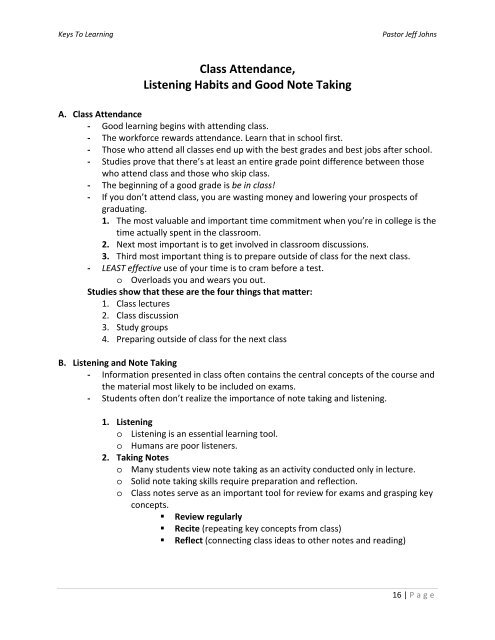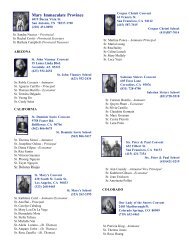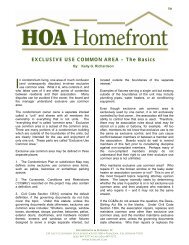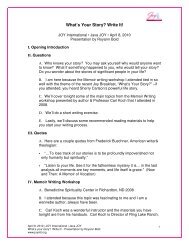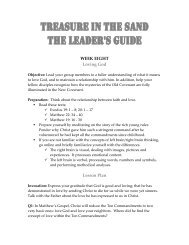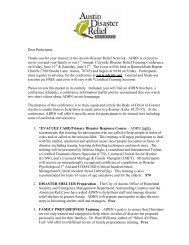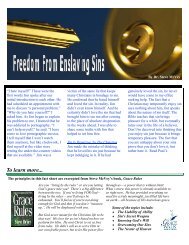Class Attendance, Listening Habits and Good Note Taking
Class Attendance, Listening Habits and Good Note Taking
Class Attendance, Listening Habits and Good Note Taking
You also want an ePaper? Increase the reach of your titles
YUMPU automatically turns print PDFs into web optimized ePapers that Google loves.
Keys To Learning<br />
Pastor Jeff Johns<br />
<strong>Class</strong> <strong>Attendance</strong>,<br />
<strong>Listening</strong> <strong>Habits</strong> <strong>and</strong> <strong>Good</strong> <strong>Note</strong> <strong>Taking</strong><br />
A. <strong>Class</strong> <strong>Attendance</strong><br />
‐ <strong>Good</strong> learning begins with attending class.<br />
‐ The workforce rewards attendance. Learn that in school first.<br />
‐ Those who attend all classes end up with the best grades <strong>and</strong> best jobs after school.<br />
‐ Studies prove that there’s at least an entire grade point difference between those<br />
who attend class <strong>and</strong> those who skip class.<br />
‐ The beginning of a good grade is be in class!<br />
‐ If you don’t attend class, you are wasting money <strong>and</strong> lowering your prospects of<br />
graduating.<br />
1. The most valuable <strong>and</strong> important time commitment when you’re in college is the<br />
time actually spent in the classroom.<br />
2. Next most important is to get involved in classroom discussions.<br />
3. Third most important thing is to prepare outside of class for the next class.<br />
‐ LEAST effective use of your time is to cram before a test.<br />
o Overloads you <strong>and</strong> wears you out.<br />
Studies show that these are the four things that matter:<br />
1. <strong>Class</strong> lectures<br />
2. <strong>Class</strong> discussion<br />
3. Study groups<br />
4. Preparing outside of class for the next class<br />
B. <strong>Listening</strong> <strong>and</strong> <strong>Note</strong> <strong>Taking</strong><br />
‐ Information presented in class often contains the central concepts of the course <strong>and</strong><br />
the material most likely to be included on exams.<br />
‐ Students often don’t realize the importance of note taking <strong>and</strong> listening.<br />
1. <strong>Listening</strong><br />
o <strong>Listening</strong> is an essential learning tool.<br />
o Humans are poor listeners.<br />
2. <strong>Taking</strong> <strong>Note</strong>s<br />
o Many students view note taking as an activity conducted only in lecture.<br />
o Solid note taking skills require preparation <strong>and</strong> reflection.<br />
o <strong>Class</strong> notes serve as an important tool for review for exams <strong>and</strong> grasping key<br />
concepts.<br />
• Review regularly<br />
• Recite (repeating key concepts from class)<br />
• Reflect (connecting class ideas to other notes <strong>and</strong> reading)<br />
16 | P age
Keys To Learning<br />
Pastor Jeff Johns<br />
C. The Importance of <strong>Good</strong> <strong>Listening</strong><br />
‐ Becoming a good listener consists of getting rid of bad listening habits <strong>and</strong> replacing<br />
them with bad.<br />
‐ Students must learn to listen.<br />
‐ If you don’t take good notes it is probably because you are not a good listener.<br />
‐ Information presented in class often contains the central concepts of the course <strong>and</strong><br />
material most likely to be covered in an exam.<br />
‐ Say, “I’m here to learn. Teach me!”<br />
‐ Research shows that individuals only recall about 50% of what they hear, <strong>and</strong> 30% of<br />
that is inaccurate.<br />
‐ In 100 minutes you may retain 10 minutes of information.<br />
o You wasted 90 minutes due to your inability to take notes because you don’t<br />
know how to listen.<br />
D. Ten Bad <strong>Listening</strong> <strong>Habits</strong><br />
1. Calling the Subject Dull<br />
o Bad listeners often find a subject too dry to comm<strong>and</strong> their attention<br />
<strong>and</strong> use this as an excuse to allow their minds to w<strong>and</strong>er.<br />
o <strong>Good</strong> listeners listen to see if the speaker has anything that can be of<br />
use to them.<br />
o Key to good listening is 3‐letter word USE<br />
• <strong>Good</strong> listeners sift, screen, winnow the wheat from the chaff.<br />
• Always hunting for something practical or worthwhile to store<br />
in their minds <strong>and</strong> put to work in months/years ahead.<br />
• G.K. Chesterton quote: In all this world there is no such thing<br />
as an uninteresting subject, only uninterested people.<br />
2. Criticizing the Speaker<br />
o Bad listeners find fault with way the speaker looks, acts, <strong>and</strong> talks.<br />
o <strong>Good</strong> listeners pay attention to what is said, not how it is said.<br />
o The message is ten times as important as the package in which it<br />
comes.<br />
3. Getting Over Stimulated<br />
o <strong>Listening</strong> efficiency drops to zero when the listeners react so strongly<br />
to one part of the presentation that they miss what follows.<br />
o Withhold evaluation until comprehension is complete – hear the<br />
speaker out!<br />
o Underst<strong>and</strong> the speaker’s point of view fully before accepting or<br />
rejecting it.<br />
17 | P age
Keys To Learning<br />
Pastor Jeff Johns<br />
4. <strong>Listening</strong> Only For Facts<br />
o Almost without exception it is the poor listeners who say they listen<br />
for facts.<br />
o They do get facts, but they garble a shocking number <strong>and</strong> completely<br />
lose most of them.<br />
o <strong>Good</strong> listeners listen for the main idea in a speech <strong>and</strong> use them as<br />
connecting threads to give sense <strong>and</strong> system to the whole.<br />
5. Trying To Outline Everything<br />
o Many speakers do not follow an outline when they speak.<br />
o Trying to take notes in outline form can hinder you.<br />
o <strong>Good</strong> listeners are flexible.<br />
o Adapt note taking to the organizational pattern of the speaker.<br />
6. Faking Attention<br />
o Merely looking like you are paying attention out of courtesy to the<br />
speaker is not productive for the listener.<br />
o <strong>Good</strong> listening is not relaxed <strong>and</strong> passive.<br />
• It’s dynamic.<br />
• It’s constructive<br />
• It’s characterized by a slightly increased heart rate, quicker<br />
circulation of the blood, <strong>and</strong> a small rise in bodily<br />
temperature.<br />
• It’s energy consuming.<br />
7. Tolerating Distraction<br />
o Poor listeners are easily distracted <strong>and</strong> may even create disturbances<br />
that interfere with their own listening efficiency <strong>and</strong> that of others.<br />
o <strong>Good</strong> listeners try to adjust to whatever distractions there are <strong>and</strong><br />
soon find they can ignore them.<br />
8. Choosing Only What’s Easy<br />
o Poor listeners have shunned listening to serious presentations on<br />
radio or TV.<br />
o They choose only easy listening.<br />
o This h<strong>and</strong>icaps anyone who needs to use listening as a learning tool.<br />
9. Letting Emotion‐Laden Words Get In the Way<br />
o Some words carry such an emotional load that they cause some<br />
listeners to tune out a speaker.<br />
o Words like “affirmative action” <strong>and</strong> “feminist” are fighting words to<br />
some people.<br />
o Don’t allow a mere symbol for something st<strong>and</strong> between you <strong>and</strong><br />
learning.<br />
18 | P age
Keys To Learning<br />
Pastor Jeff Johns<br />
o Don’t allow your attitude <strong>and</strong> opinion to interfere with your listening.<br />
10. Wasting the Differential Between Speech <strong>and</strong> Thought Speed<br />
o Americans speak at an average rate of 125 words per minute in<br />
ordinary conversation – 100 words per minute before an audience.<br />
o How fast do listeners listen An audience of any size will average 400<br />
– 500 words per minute as they listen.<br />
o This gives the opportunity for the listener to do some evaluating as<br />
the speech progresses. To do this good listeners practice these three<br />
skills in concentration:<br />
• Anticipating the next point.<br />
• Identifying supporting material.<br />
• Recapitulating.<br />
LEARNING BY LISTENING<br />
*Academic Skills Center*Dartmouth College*301 Collis*HB 6173*(603)646‐2014* asc@dartmouth.edu*<br />
*http://www.dartmouth.edu/admin/acskills/*<br />
You can learn a lot through listening. In college, it will be a prime source of information. Unfortunately,<br />
people do not instinctively listen well. <strong>Listening</strong> is a skill which must be developed.<br />
If you apply the following suggestions, you will find yourself listening more effectively, both in class<br />
<strong>and</strong> out.<br />
1. Determine why what the speaker is saying is important to you. If you don't have an immediate, vivid<br />
reason for listening to a speaker, you are an unmotivated listener.<br />
2. Take responsibility for what is being said. The responsibility for interest <strong>and</strong> underst<strong>and</strong>ing lies with<br />
you, not with the speaker. Learning is up to the learner. If you simply want to sit passively <strong>and</strong> blame the<br />
speaker for your lack of success, then you're not a serious learner.<br />
3. If you can't hear, arrange things so you can. Move away from sources of noise‐human or mechanical.<br />
Sit where you can see the speaker easily, <strong>and</strong> where other distractions are at a minimum.<br />
4. Listen to what the speaker is saying. Don't tune the speaker out because you don't like something<br />
about him/her or the message. Be sure you underst<strong>and</strong> something before you reject it.<br />
5. Look for the speaker's pattern of organization. In a lecture, a speaker is generally referring to notes<br />
or some other source of information. You can underst<strong>and</strong> much better if you are able to recognize what<br />
the speaker's driving at <strong>and</strong> how the speaker's getting there.<br />
6. Look for the main idea or ideas of the presentation. Facts are important only as they support the<br />
speaker's points. If you have trouble distinguishing between the important <strong>and</strong> the trivial, a friend or a<br />
tutor in the Academic Skills Center can help you.<br />
19 | P age
Keys To Learning<br />
Pastor Jeff Johns<br />
7. Don't let your mind w<strong>and</strong>er. Your thoughts move far more rapidly than the swiftest mouth, <strong>and</strong> the<br />
urge to stray is tempting. Your attention span can be increased, however, through deliberate effort.<br />
Continue to practice the habit of attention <strong>and</strong> don't be discouraged by early failures.<br />
8. Take notes while you listen. Even if you recognize everything being said, jot it down, because you<br />
won't remember it later unless you do.<br />
TAKING LECTURE NOTES<br />
©Academic Skills Center, Dartmouth College 2001<br />
I. There are many reasons for taking lecture notes.<br />
A. Making yourself take notes forces you to listen carefully <strong>and</strong> test your underst<strong>and</strong>ing of the material.<br />
B. When you are reviewing, notes provide a gauge to what is important in the text.<br />
C. Personal notes are usually easier to remember than the text.<br />
D. The writing down of important points helps you to remember then even before you have studied the<br />
material formally.<br />
II. Instructors usually give clues to what is important to take down. Some of the more common clues are:<br />
A. Material written on the blackboard.<br />
B. Repetition<br />
C. Emphasis<br />
1. Emphasis can be judged by tone of voice <strong>and</strong> gesture.<br />
2. Emphasis can be judged by the amount of time the instructor spends on points <strong>and</strong> the number of<br />
examples he or she uses.<br />
D. Word signals (e.g. "There are two points of view on . . . " "The third reason is . . . " " In conclusion . . . ")<br />
E. Summaries given at the end of class.<br />
F. Reviews given at the beginning of class.<br />
III. Each student should develop his or her own method of taking notes, but most students find the following<br />
suggestions helpful:<br />
A. Make your notes brief.<br />
1. Never use a sentence where you can use a phrase. Never use a phrase where you can use a word.<br />
2. Use abbreviations <strong>and</strong> symbols, but be consistent.<br />
B. Put most notes in your own words. However, the following should be noted exactly:<br />
1. Formulas<br />
2. Definitions<br />
3. Specific facts<br />
C. Use outline form <strong>and</strong>/or a numbering system. Indention helps you distinguish major from minor points.<br />
D. If you miss a statement, write key words, skip a few spaces, <strong>and</strong> get the information later.<br />
E. Don't try to use every space on the page. Leave room for coordinating your notes with the text after the<br />
lecture. (You may want to list key terms in the margin or make a summary of the contents of the page.)<br />
F. Date your notes. Perhaps number the pages.<br />
20 | P age
Keys To Learning<br />
Pastor Jeff Johns<br />
NOTE MAKING<br />
©Academic Skills Center, Dartmouth College 2001<br />
Learning to make notes effectively will help you to improve your study <strong>and</strong> work habits <strong>and</strong> to remember<br />
important information. Often, students are deceived into thinking that because they underst<strong>and</strong> everything<br />
that is said in class they will therefore remember it. This is dead wrong! Write it down.<br />
As you make notes, you will develop skill in selecting important material <strong>and</strong> in discarding unimportant<br />
material. The secret to developing this skill is practice. Check your results constantly. Strive to improve.<br />
<strong>Note</strong>s enable you to retain important facts <strong>and</strong> data <strong>and</strong> to develop an accurate means of arranging<br />
necessary information.<br />
Here are some hints on note making.<br />
1. Don't write down everything that you read or hear. Be alert <strong>and</strong> attentive to the main points.<br />
Concentrate on the "meat" of the subject <strong>and</strong> forget the trimmings.<br />
2. <strong>Note</strong>s should consist of key words or very short sentences. If a speaker gets sidetracked it is often<br />
possible to go back <strong>and</strong> add further information.<br />
3. Take accurate notes. You should usually use your own words, but try not to change the meaning. If you<br />
quote directly from an author, quote correctly.<br />
4. Think a minute about your material before you start making notes. Don't take notes just to be taking<br />
notes! Take notes that will be of real value to you when you look over them at a later date.<br />
5. Have a uniform system of punctuation <strong>and</strong> abbreviation that will make sense to you. Use a skeleton<br />
outline <strong>and</strong> show importance by indenting. Leave lots of white space for later additions.<br />
6. Omit descriptions <strong>and</strong> full explanations. Keep your notes short <strong>and</strong> to the point. Condense your material<br />
so you can grasp it rapidly.<br />
7. Don't worry about missing a point.<br />
8. Don't keep notes on oddly shaped pieces of paper. Keep notes in order <strong>and</strong> in one place.<br />
9. Shortly after making your notes, go back <strong>and</strong> rework (not redo) your notes by adding extra points <strong>and</strong><br />
spelling out unclear items. Remember, we forget rapidly. Budget time for this vital step just as you do for<br />
the class itself.<br />
10. Review your notes regularly. This is the only way to achieve lasting memory.<br />
21 | P age


